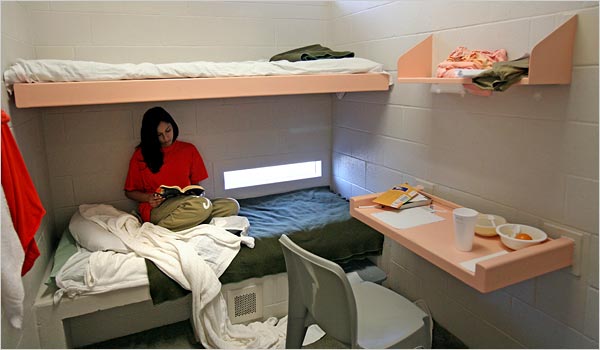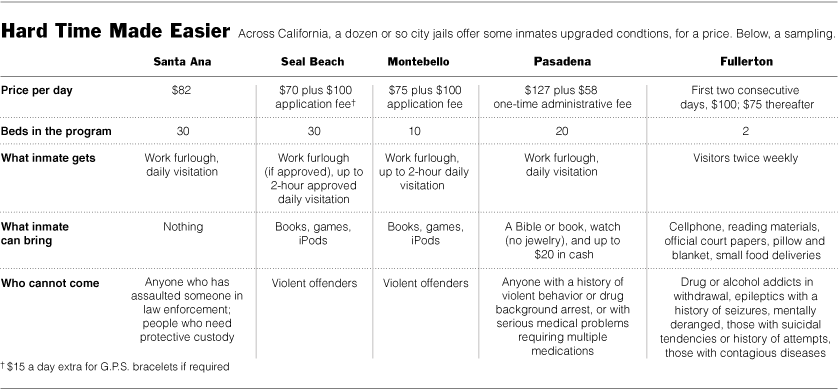| Want to send this page or a link to a friend? Click on mail at the top of this window. |
More Special Reports |
| Posted April 30, 2007 |
For $82 a Day, Booking A Cell in a Five-Star Jail |
|
 |
|
Monica Almeida/The New York Times |
|
| Nicole Brockett is serving her sentence for drunken-driving in a pay-to-pay-stay cell at the jail in Santa Ana, Calif. |
____________ |
|
By JENNIFER STEINHAUER |
SANTA ANA, Calif., April 25 — Anyone convicted of a crime knows a debt to society often must be paid in jail. But a slice of Californians willing to supplement that debt with cash (no personal checks, please) are finding that the time can be almost bearable.
For offenders whose crimes are usually relatively minor (carjackers should not bother) and whose bank accounts remain lofty, a dozen or so city jails across the state offer pay-to-stay upgrades. Theirs are a clean, quiet, if not exactly recherché alternative to the standard county jails, where the walls are bars, the fellow inmates are hardened and privileges are few.
Many of the self-pay jails operate like secret velvet-roped nightclubs of the corrections world. You have to be in the know to even apply for entry, and even if the court approves your sentence there, jail administrators can operate like bouncers, rejecting anyone they wish.
“I am aware that this is considered to be a five-star Hilton,” said Nicole Brockett, 22, who was recently booked into one of the jails, here in Orange County about 30 miles southeast of Los Angeles, and paid $82 a day to complete a 21-day sentence for a drunken driving conviction.
Ms. Brockett, who in her oversize orange T-shirt and flip-flops looked more like a contestant on “The Real World” than an inmate, shopped around for the best accommodations, travelocity.com-style.
“It’s clean here,” she said, perched in a jail day room on the sort of couch found in a hospital emergency room. “It’s safe and everyone here is really nice. I haven’t had a problem with any of the other girls. They give me shampoo.”
For roughly $75 to $127 a day, these convicts — who are known in the self-pay parlance as “clients” — get a small cell behind a regular door, distance of some amplitude from violent offenders and, in some cases, the right to bring an iPod or computer on which to compose a novel, or perhaps a song.
Many of the overnighters are granted work furlough, enabling them to do most of their time on the job, returning to the jail simply to go to bed (often following a strip search, which granted is not so five-star).
The clients usually share a cell, but otherwise mix little with the ordinary nonpaying inmates, who tend to be people arrested and awaiting arraignment, or federal prisoners on trial or awaiting deportation and simply passing through.
The pay-to-stay programs have existed for years, but recently attracted some attention when prosecutors balked at a jail in Fullerton that they said would offer computer and cellphone use to George Jaramillo, a former Orange County assistant sheriff who pleaded no contest to perjury and misuse of public funds, including the unauthorized use of a county helicopter. Mr. Jaramillo was booked into the self-pay program in Montebello, near Los Angeles, instead.
“We certainly didn’t envision a jail with cellphone and laptop capabilities where his family could bring him three hot meals,” said Susan Kang Schroeder, the public affairs counsel for the Orange County district attorney. “We felt that the use of the computer was part of the instrumentality of his crime, and that is another reason we objected to that.”
 |
A spokesman for the Fullerton jail said cellphones but not laptops were allowed.
While jails in other states may offer pay-to-stay programs, numerous jail experts said they did not know of any.
“I have never run into this,” said Ken Kerle, managing editor of the publication American Jail Association and author of two books on jails. “But the rest of the country doesn’t have Hollywood either. Most of the people who go to jail are economically disadvantaged, often mentally ill, with alcohol and drug problems and are functionally illiterate. They don’t have $80 a day for jail.”
The California prison system, severely overcrowded, teeming with violence and infectious diseases and so dysfunctional that much of it is under court supervision, is one that anyone with the slightest means would most likely pay to avoid.
“The benefits are that you are isolated and you don’t have to expose yourself to the traditional county system,” said Christine Parker, a spokeswoman for CSI, a national provider of jails that runs three in Orange County with pay-to-stay programs. “You can avoid gang issues. You are restricted in terms of the number of people you are encountering and they are a similar persuasion such as you.”
Most of the programs — which offer 10 to 30 beds — stay full enough that marketing is not necessary, though that was not always the case. The Pasadena jail, for instance, tried to create a little buzz for its program when it was started in the early 1990s. Skip to next paragraph Multimedia Graphic Hard Time Made Easier
“Our sales pitch at the time was, ‘Bad things happen to good people,’ ” said Janet Givens, a spokeswoman for the Pasadena Police Department. Jail representatives used Rotary Clubs and other such venues as their potential marketplace for “fee-paying inmate workers” who are charged $127 a day (payment upfront required).
“People might have brothers, sisters, cousins, etc., who might have had a lapse in judgment and do not want to go to county jail,” Ms. Givens said.
The typical pay-to-stay client, jail representatives agreed, is a man in his late 30s who has been convicted of driving while intoxicated and sentenced to a month or two in jail.
But there are single-night guests, and those who linger well over a year.
“One individual wanted to do four years here,” said Christina Holland, a correctional manager of the Santa Ana jail.
Inmates in Santa Ana who have been approved for pay to stay by the courts and have coughed up a hefty deposit for their stay, enter the jail through a lobby and not the driveway reserved for the arrival of other prisoners. They are strip searched when they return from work each day because the biggest problem they pose is the smuggling of contraband, generally cigarettes, for nonpaying inmates.
_________________ |
|
| A cleaner, safer alternative for nonviolent offenders of means. | |
_________________ |
Most of the jailers require the inmates to do chores around the jails, even if they work elsewhere during the day.
“I try real hard to keep them in custody for 12 hours,” Ms. Holland said. “Because I think that’s fair.”
Critics argue that the systems create inherent injustices, offering cleaner, safer alternatives to those who can pay.
“It seems to be to be a little unfair,” said Mike Jackson, the training manager of the National Sheriff’s Association. “Two people come in, have the same offense, and the guy who has money gets to pay to stay and the other doesn’t. The system is supposed to be equitable.”
But cities argue that the paying inmates generate cash, often hundreds of thousands of dollars a year — enabling them to better afford their other taxpayer-financed operations — and are generally easy to deal with.
“We never had a problem with self pay,” said Steve Lechuga, the operations manager for CSI. “I haven’t seen any fights in years. We had a really good success rate with them.”
Stanley Goldman, a professor of criminal law at Loyola Law School in Los Angeles, has recommended the program to former clients.
“The prisoners who are charged with nonviolent crimes and typically have no record are not in the best position to handle themselves in the general county facility,” Professor Goldman said.
Still, no doubt about it, the self-pay jails are not to be confused with Canyon Ranch.
The cells at Santa Ana are roughly the size of a custodial closet, and share its smell and ambience. Most have little more than a pink bottle of jail-issue moisturizer and a book borrowed from the day room. Lockdown can occur for hours at a time, and just feet away other prisoners sit with their faces pressed against cell windows, looking menacing.
Ms. Brockett, who normally works as a bartender in Los Angeles, said the experience was one she never cared to repeat.
“It does look decent,” she said, “but you still feel exactly where you are.”
Copyright 2007 The New York Times Company. Reprinted from The New York Times, National, of Sunday, April 29, 2007.
| Wehaitians.com, the scholarly journal of democracy and human rights |
| More from wehaitians.com |